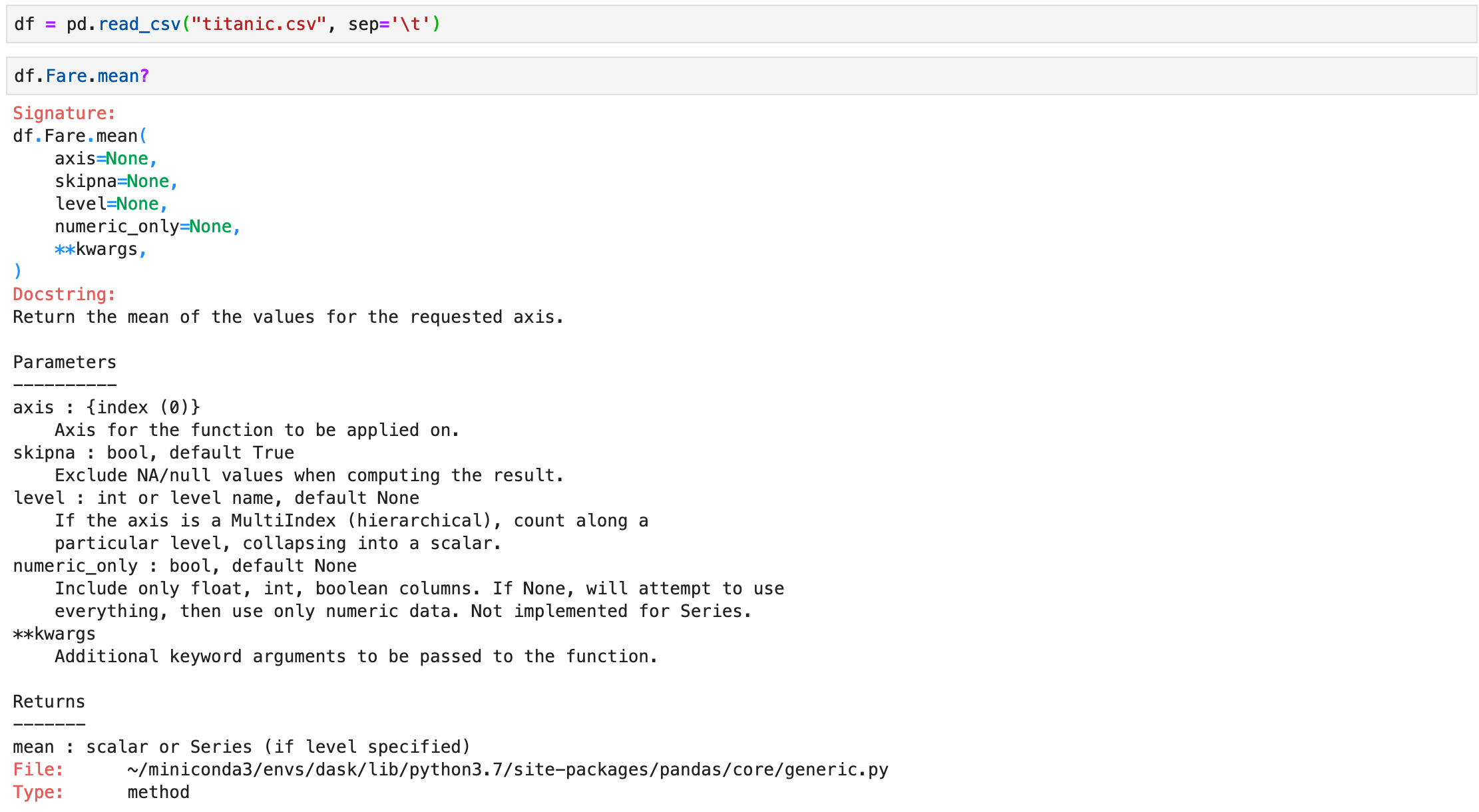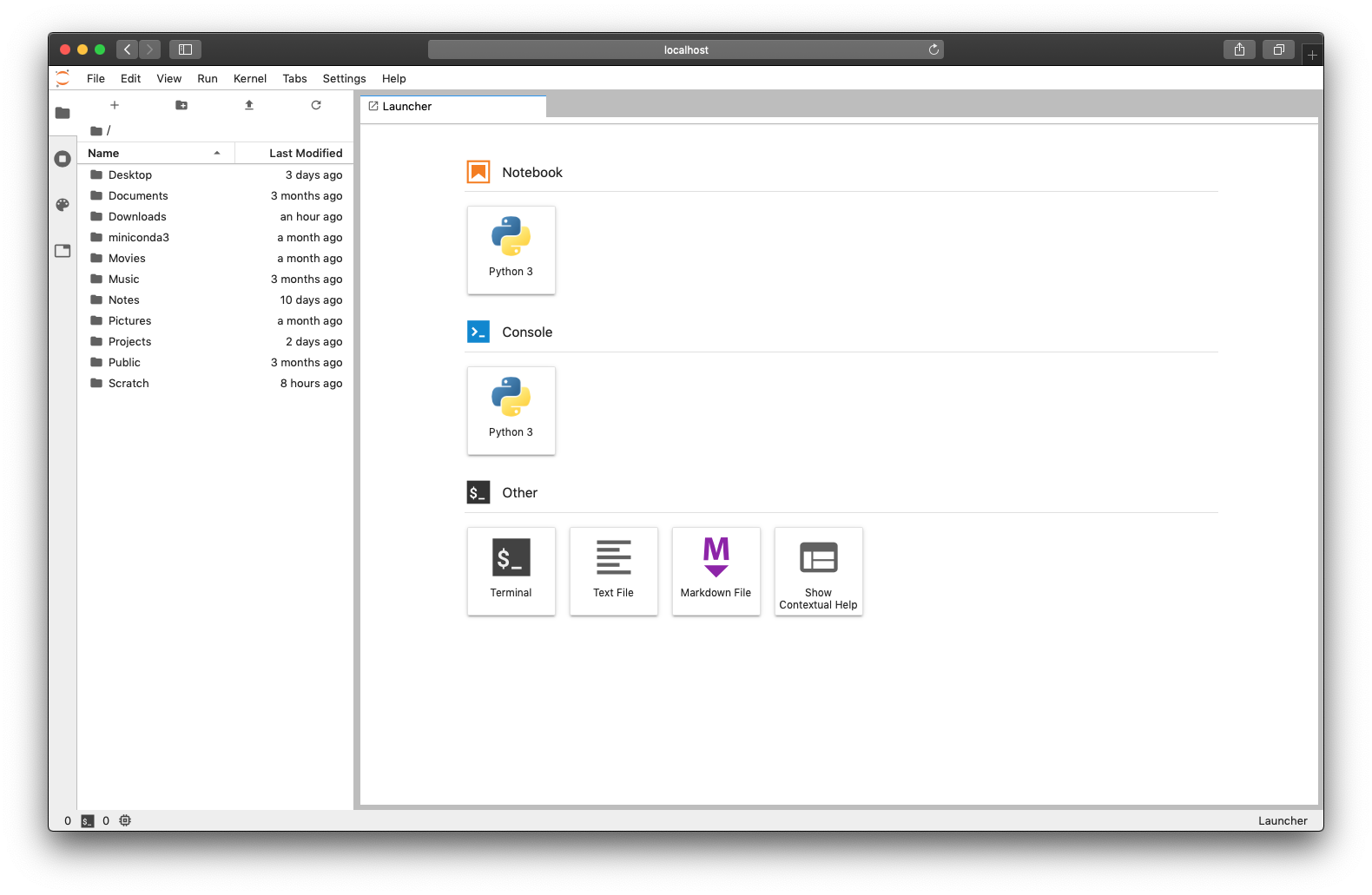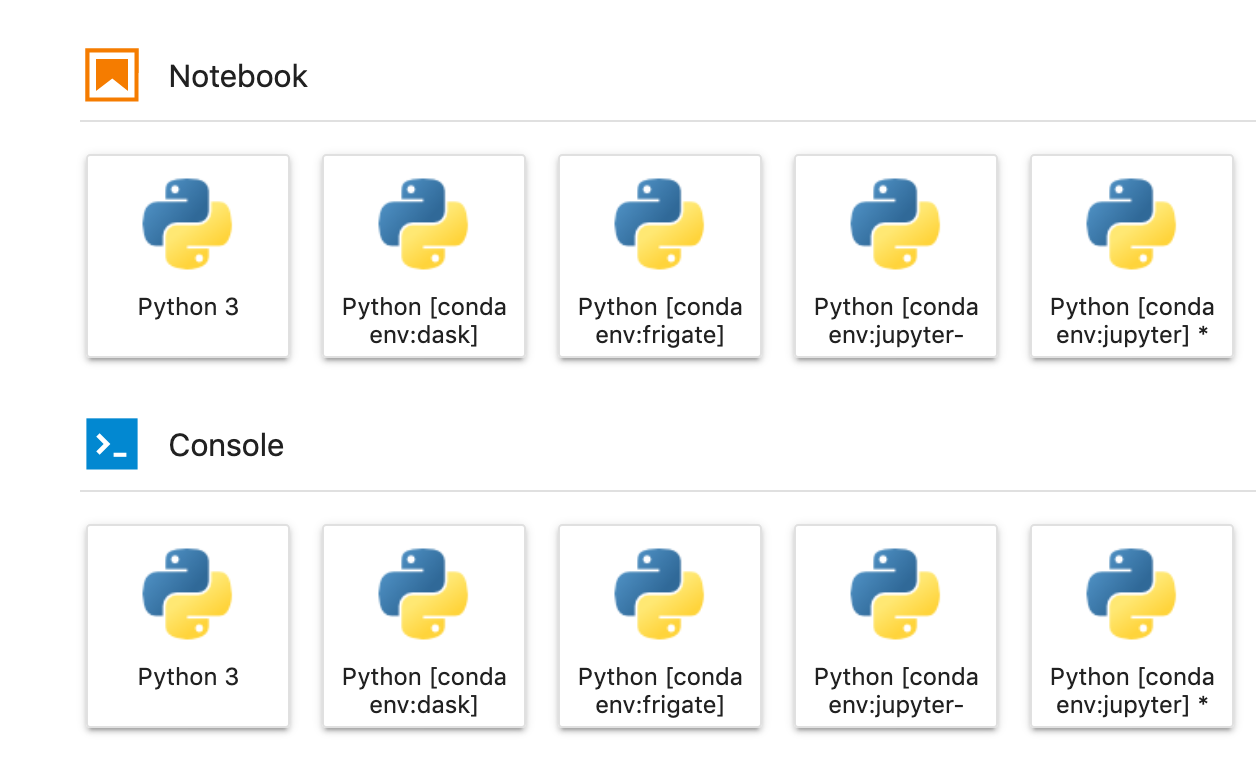In my day to day work I generally access a variety of Jupyter installations. Sometimes these are short lived installations in conda environments on my laptop, sometimes they are running on a remote server, and sometimes I use a managed service like JupyterHub or Binder.
However, I find it really useful to keep a simple minimal installation always running on my laptop. Jupyter notebooks are my preferred Python REPL to quickly testing out a bit of syntax. I also find them useful for exploring Python objects with tab completion and viewing docstrings.


In this post I’m going to walk through my Jupyter Lab setup on my MacBook and how I have it set to run automatically on startup.
Installation
I use conda to manage my local Python environments and install packages. You can set up conda on your own machine quickly and easily using the miniconda installers.
I tend to avoid the base environment in conda as I often end up accidentally installing things here. I generally create new conda environments for each project or task I am working on. These can be short lived (minutes or hours) or hang around forever.
For my persistent Jupyter Lab installation I’m going to create a new conda environment called jupyter, which will probably hang around forever.
$ conda create -n jupyter python ipython jupyterlab nodejs
$ conda activate jupyter
In this environment I’ve installed Python, IPython, Jupyter Lab and NodeJS.
Running Jupyter Lab
Let’s test our Jupyter Lab installation by running it for the first time.
$ jupyter lab

Great we have our Jupyter Lab successfully running. In theory I could stop here and every time I start my computer I could open a shell and run a couple of commands to get Jupyter Lab up and running.
$ conda activate jupyter
$ jupyter lab
But I’m lazy, I don’t want to have to remember to do that every time I reboot. I just want it to start automatically.
LaunchAgents
On macOS there is a directory called ~/Library/LaunchAgents/. In this directory you can place Apple .plist files which will be parsed when you login.
You can configure many things in here but the one we are interested in today is running a Jupyter server automatically when we log in. Let’s place our own .plist file in this directory called jupyter.plist.
We will configure this file to run Jupyter on startup.
<?xml version="1.0" encoding="UTF-8"?>
<!DOCTYPE plist PUBLIC "-//Apple Computer//DTD PLIST 1.0//EN" "http://www.apple.com/DTDs/PropertyList-1.0.dtd">
<plist version="1.0">
<dict>
<key>Label</key>
<string>jupyter-startup</string>
<key>ProgramArguments</key>
<array>
<string>/Users/<username>/conda/envs/jupyter/bin/jupyter</string>
<string>lab</string>
<string>--no-browser</string>
</array>
<key>WorkingDirectory</key>
<string>/Users/<username></string>
<key>RunAtLoad</key>
<true/>
<key>StandardOutPath</key>
<string>/Users/<username>/Library/Logs/jupyter.log</string>
<key>StandardErrorPath</key>
<string>/Users/<username>/Library/Logs/jupyter.log</string>
</dict>
</plist>
In this config file we have specified that we want /Users/<username>/conda/envs/jupyter/bin/jupyter lab --no-browser to run whenever we log in and the stdout and stderr from that script should go to /Users/<username>/Library/Logs/jupyter.log.
These locations are different on my laptop to yours and you will want to point them to somewhere sensible on yours.
jupyter. With that setup however, it is not possible to allow Jupyter to access files in e.g. Documents, Desktop and network locations. By launching Jupyter directly, you now get a popup (on recent Mac systems) asking you whether you trust python to access those locations.
Testing
To test your LaunchAgent and script without logging out and back in you can run launchctl directly.
$ launchctl load ~/Library/LaunchAgents/jupyter.plist
You should now be able to visit https://localhost:8888 in your browser and access your Jupyter Lab installation.
.plist file or in /var/log/system.log.
You can stop your Jupyter Lab session again also using launchctl.
$ launchctl unload ~/Library/LaunchAgents/jupyter.plist
Finally once you are happy that things are working you should restart your laptop and then visit the Jupyter Lab URL in your browser to ensure everything started correctly.
Jupyter Lab extensions
Now that we have our persistent Jupyter Lab environment we may want to augment it with a few extensions.
nb_conda_kernels
The most important extension I install when setting up my persistent environment is nb_conda_kernels.
$ conda install -n jupyter nb_conda_kernels
I want to keep the jupyter conda environment that we created as clean and minimal as possible. It’s just for Jupyter and I don’t want to use it for doing any Python work. Therefore you can install nb_conda_kernels which automatically makes any local conda environment available as a kernel in Jupyter Lab. This way I can continue to create task and project specific environments and easily access them from Jupyter Lab.

ipykernel package installed.
Other extensions
Other than that you can tailor your Jupyter Lab environment however you like. I recommend checking out this Awesome Jupyter list.
Wrap up
That’s it! We now have Jupyter Lab installed in it’s own conda environment, it will start automatically when you log in and you can access all your other conda environments from it.
I find this a very useful thing to have on my laptop and use it every day.
 Jacob Tomlinson
Jacob Tomlinson